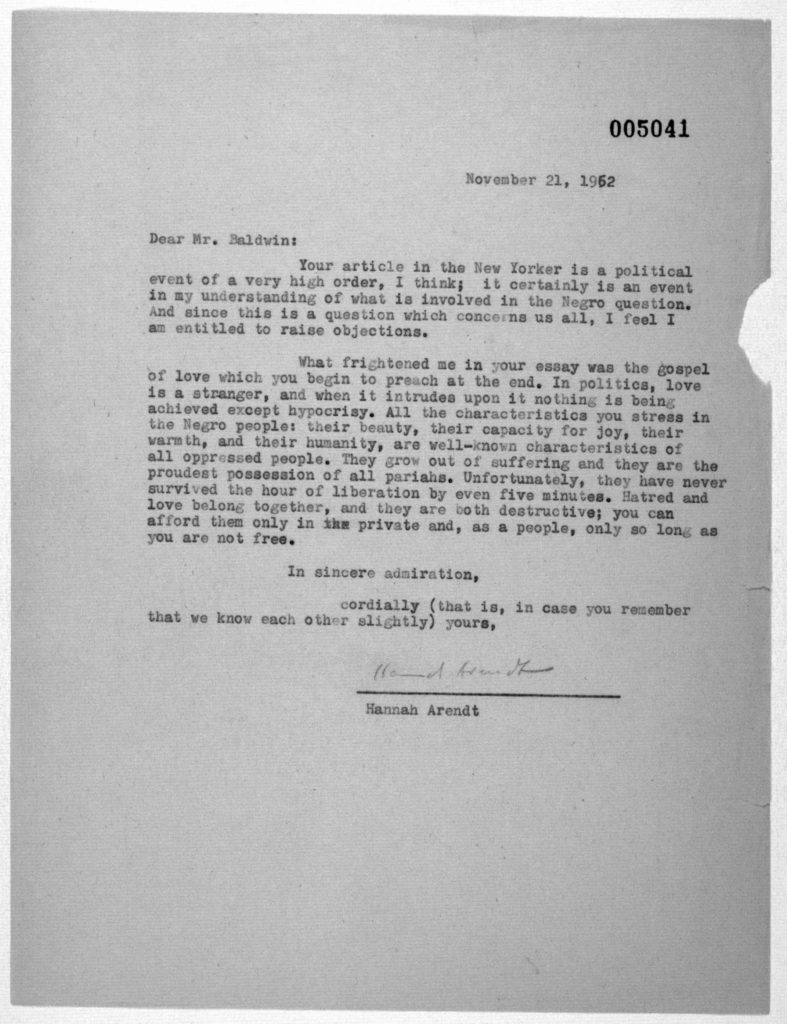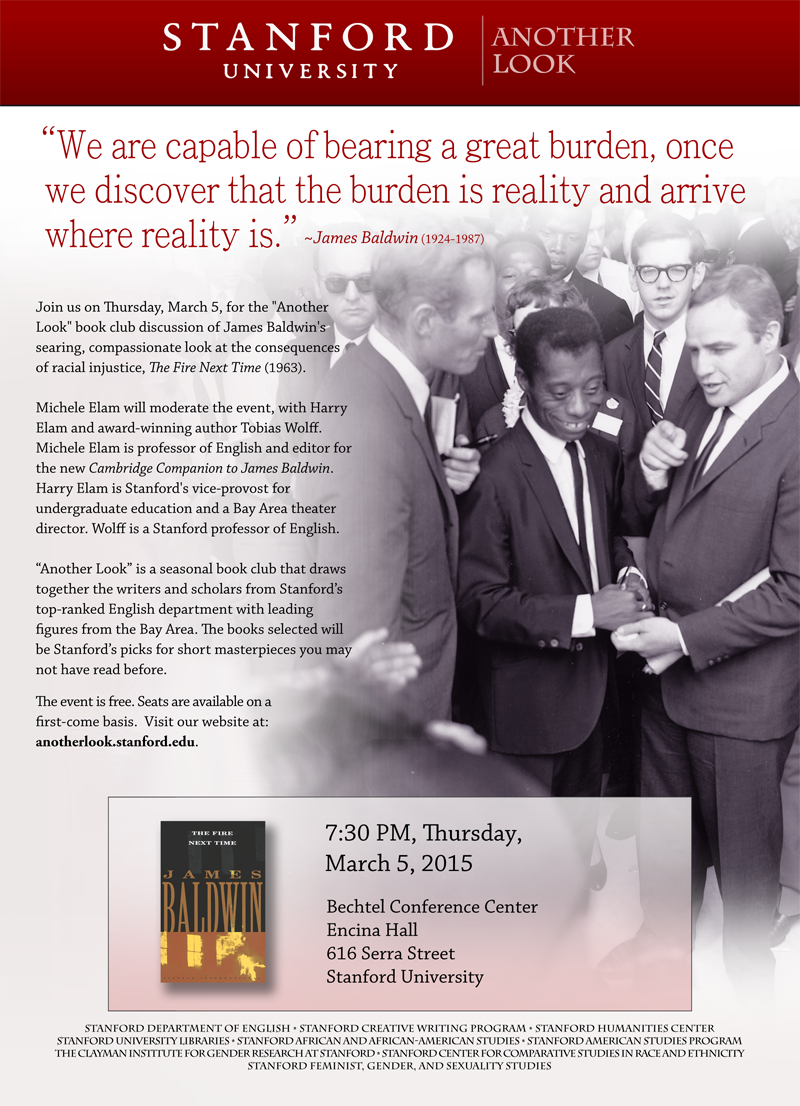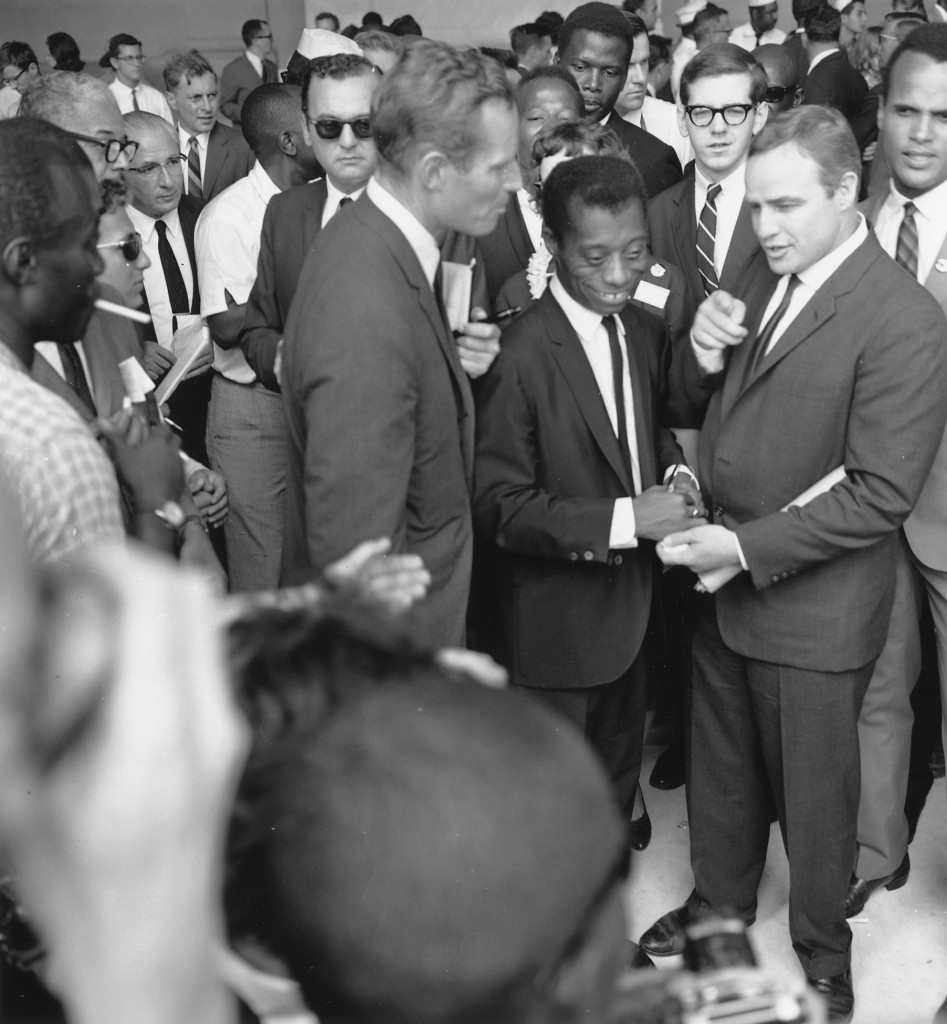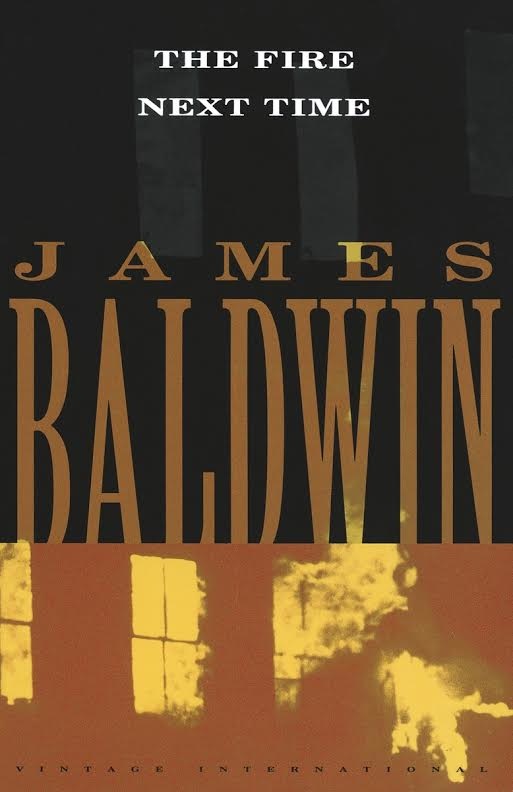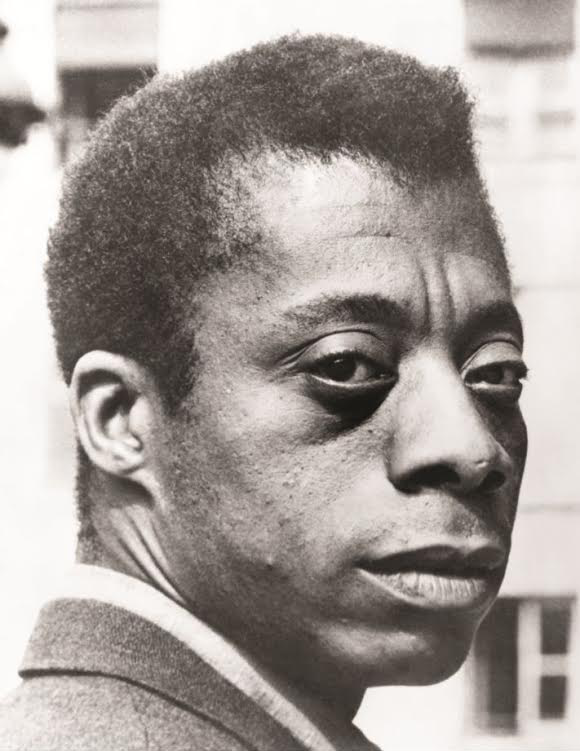
March on Washington, 1963. With Marlon Brando, Charlton Heston, Harry Belafonte, Sidney Poitier.
James Baldwin was an eminent essayist, novelist, and playwright – but he was also a master of the Q&A interview. Perhaps his 1984 Paris Review interview was his best, with interviewers Jordan Elgrably and George Plimpton (read the whole thing here). We include some excerpts below.
May this post serve as a reminder that this Thursday, March 5, at 7:30 p.m., the Another Look book club will feature a discussion of Baldwin’s incendiary The Fire Next Time (1963) at the Bechtel Conference Center at Encina Hall at 616 Serra Street on the Stanford campus. Another Look discussions are free and open to the public, with no reserved seating. The discussion will be moderated by Michele Elam, professor of English, with Harry Elam, vice provost for undergraduate education, and acclaimed author Tobias Wolff, professor of English and the founding director of Another Look. Michele Elam is a widely published authority on race and culture; Harry Elam is a leading scholar of African American theater and performance.
Now here are the excerpts from The Paris Review. In the first passage, the interview asks Baldwin about his flight to France, where he eventually died at his home in Saint-Paul de Vence in 1987:
INTERVIEWER: Why did you choose France?
BALDWIN: It wasn’t so much a matter of choosing France—it was a matter of getting out of America. I didn’t know what was going to happen to me in France but I knew what was going to happen to me in New York. If I had stayed there, I would have gone under, like my friend on the George Washington Bridge.
INTERVIEWER: You say the city beat him to death. You mean that metaphorically.
BALDWIN: Not so metaphorically. Looking for a place to live. Looking for a job. You begin to doubt your judgment, you begin to doubt everything. You become imprecise. And that’s when you’re beginning to go under. You’ve been beaten, and it’s been deliberate. The whole society has decided to make you nothing. And they don’t even know they’re doing it.
INTERVIEWER: Has writing been a type of salvation?
BALDWIN: I’m not so sure! I’m not sure I’ve escaped anything. One still lives with it, in many ways. It’s happening all around us, every day. It’s not happening to me in the same way, because I’m James Baldwin; I’m not riding the subways and I’m not looking for a place to live. But it’s still happening. So salvation is a difficult word to use in such a context. I’ve been compelled in some ways by describing my circumstances to learn to live with them. It’s not the same thing as accepting them.
INTERVIEWER: Was there an instant you knew you were going to write, to be a writer rather than anything else?

“Claim it all – including Shakespeare.” (Photo: Allan Warren)
BALDWIN: Yes. The death of my father. Until my father died I thought I could do something else. I had wanted to be a musician, thought of being a painter, thought of being an actor. This was all before I was nineteen. … My father didn’t think it was possible—he thought I’d get killed, get murdered. … He died when his last child was born and I realized I had to make a jump—a leap. I’d been a preacher for three years, from age fourteen to seventeen. Those were three years which probably turned me to writing.
INTERVIEWER: Were the sermons you delivered from the pulpit very carefully prepared, or were they absolutely off the top of your head?
BALDWIN: I would improvise from the texts, like a jazz musician improvises from a theme. I never wrote a sermon—I studied the texts. I’ve never written a speech. I can’t read a speech. It’s kind of give-and-take. You have to sense the people you’re talking to. You have to respond to what they hear.
INTERVIEWER: Do you have a reader in your mind when you write?
BALDWIN: No, you can’t have that.
INTERVIEWER: So it’s quite unlike preaching?
BALDWIN: Entirely. The two roles are completely unattached. When you are standing in the pulpit, you must sound as though you know what you’re talking about. When you’re writing, you’re trying to find out something which you don’t know. The whole language of writing for me is finding out what you don’t want to know, what you don’t want to find out. But something forces you to anyway. …
INTERVIEWER: Was there anyone to guide you?
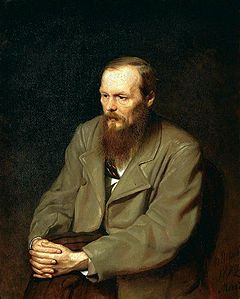
Baldwin’s teacher – or one of them.
BALDWIN: I remember standing on a street corner with the black painter Beauford Delaney down in the Village, waiting for the light to change, and he pointed down and said, “Look.” I looked and all I saw was water. And he said, “Look again,” which I did, and I saw oil on the water and the city reflected in the puddle. It was a great revelation to me. I can’t explain it. He taught me how to see, and how to trust what I saw. Painters have often taught writers how to see. And once you’ve had that experience, you see differently.
INTERVIEWER: Do you think painters would help a fledgling writer more than another writer might? Did you read a great deal?
BALDWIN: I read everything. I read my way out of the two libraries in Harlem by the time I was thirteen. One does learn a great deal about writing this way. First of all, you learn how little you know. It is true that the more one learns the less one knows. I’m still learning how to write. I don’t know what technique is. All I know is that you have to make the reader see it. This I learned from Dostoevsky, from Balzac.
***
INTERVIEWER: “One writes out of one thing only—one’s own experience,” you’ve said.
BALDWIN: Yes, and yet one’s own experience is not necessarily one’s twenty-four-hour reality. Everything happens to you, which is what Whitman means when he says in his poem “Heroes,” “I am the man, I suffered, I was there.” It depends on what you mean by experience.
***
INTERVIEWER: You were in utter despair after the death of Martin Luther King Jr. Did you find it difficult to write then, or do you work better out of anguish?
BALDWIN: No one works better out of anguish at all; that’s an incredible literary conceit. I didn’t think I could write at all. I didn’t see any point to it. I was hurt . . . I can’t even talk about it. I didn’t know how to continue, didn’t see my way clear.
***
INTERVIEWER: Is there a big shifting of gears between writing fiction and writing nonfiction?
BALDWIN: Shifting gears, you ask. Every form is difficult, no one is easier than another. They all kick your ass. None of it comes easy. …
INTERVIEWER: But the essay is a little bit simpler, isn’t it, because you’re angry about something which you can put your finger on . . .

“I was hurt … I can’t even talk about it.”
BALDWIN: An essay is not simpler, though it may seem so. An essay is essentially an argument. The writer’s point of view in an essay is always absolutely clear. The writer is trying to make the readers see something, trying to convince them of something. In a novel or a play you’re trying to show them something. The risks, in any case, are exactly the same.
INTERVIEWER: What are your first drafts like?
BALDWIN: They are overwritten. Most of the rewrite, then, is cleaning. Don’t describe it, show it. That’s what I try to teach all young writers—take it out! Don’t describe a purple sunset, make me see that it is purple.
INTERVIEWER: As your experience about writing accrues, what would you say increases with knowledge?
BALDWIN: You learn how little you know. It becomes much more difficult because the hardest thing in the world is simplicity. And the most fearful thing, too. It becomes more difficult because you have to strip yourself of all your disguises, some of which you didn’t know you had. You want to write a sentence as clean as a bone. That is the goal.
***
INTERVIEWER: Yes, before 1968, you said, “I love America.”
BALDWIN: Long before then. I still do, though that feeling has changed in the face of it. I think that it is a spiritual disaster to pretend that one doesn’t love one’s country. You may disapprove of it, you may be forced to leave it, you may live your whole life as a battle, yet I don’t think you can escape it. There isn’t any other place to go—you don’t pull up your roots and put them down someplace else. At least not in a single lifetime, or, if you do, you’ll be aware of precisely what it means, knowing that your real roots are always elsewhere. If you try to pretend you don’t see the immediate reality that formed you I think you’ll go blind. … I believe what one has to do as a black American is to take white history, or history as written by whites, and claim it all—including Shakespeare.
 “When I was very young, and was dealing with my buddies in those wine- and urine-stained hallways, something in me wondered, What will happen to all that beauty? For black people, though I am aware that some of us, black and white, do not know it yet, are very beautiful. And when I sat at Elijah’s table and watched the baby, the women, and the men, and we talked about God’s – or Allah’s – vengeance, I wondered, when that vengeance was achieved, What will happen to all that beauty then? I could also see that the intransigence and ignorance of the white world might make that vengeance inevitable – a vengeance that does not really depend on, and cannot really be executed by, any person or organization, and that cannot be prevented by any police force or army: historical vengeance, a cosmic vengeance, based on the law that we recognize when we say, “Whatever goes up must come down.” And here we are, at the center of the arc, trapped in the gaudiest, most valuable, and most improbable water wheel the world has ever seen. Everything now, we must assume, is in our hands; we have no right to assume otherwise. If we – and now I mean the relatively conscious whites and the relatively conscious blacks, who must, like lovers, insist on, or create, the consciousness of the others – do not falter in our duty now, we may be able, handful that we are, to end the racial nightmare, and achieve our country, and change the history of the world. If we do not now dare everything, the fulfillment of that prophecy, re-created from the Bible in song by a slave, is upon us: God gave Noah the rainbow sign, No more water, the fire next time!
“When I was very young, and was dealing with my buddies in those wine- and urine-stained hallways, something in me wondered, What will happen to all that beauty? For black people, though I am aware that some of us, black and white, do not know it yet, are very beautiful. And when I sat at Elijah’s table and watched the baby, the women, and the men, and we talked about God’s – or Allah’s – vengeance, I wondered, when that vengeance was achieved, What will happen to all that beauty then? I could also see that the intransigence and ignorance of the white world might make that vengeance inevitable – a vengeance that does not really depend on, and cannot really be executed by, any person or organization, and that cannot be prevented by any police force or army: historical vengeance, a cosmic vengeance, based on the law that we recognize when we say, “Whatever goes up must come down.” And here we are, at the center of the arc, trapped in the gaudiest, most valuable, and most improbable water wheel the world has ever seen. Everything now, we must assume, is in our hands; we have no right to assume otherwise. If we – and now I mean the relatively conscious whites and the relatively conscious blacks, who must, like lovers, insist on, or create, the consciousness of the others – do not falter in our duty now, we may be able, handful that we are, to end the racial nightmare, and achieve our country, and change the history of the world. If we do not now dare everything, the fulfillment of that prophecy, re-created from the Bible in song by a slave, is upon us: God gave Noah the rainbow sign, No more water, the fire next time! What frightened me in your essay was the gospel of love which you begin to preach at the end. In politics, love is a stranger, and when it intrudes upon it nothing is being achieved except hypocrisy. All the characteristics you stress in the Negro people: their beauty, their capacity for joy, their warmth, and their humanity, are well-known characteristics of all oppressed people. They grow out of suffering and they are the proudest possession of all pariahs. Unfortunately, they have never survived the hour of liberation by even five minutes. Hatred and love belong together, and they are both destructive; you can afford them only in the private and, as a people, only so long as you are not free.
What frightened me in your essay was the gospel of love which you begin to preach at the end. In politics, love is a stranger, and when it intrudes upon it nothing is being achieved except hypocrisy. All the characteristics you stress in the Negro people: their beauty, their capacity for joy, their warmth, and their humanity, are well-known characteristics of all oppressed people. They grow out of suffering and they are the proudest possession of all pariahs. Unfortunately, they have never survived the hour of liberation by even five minutes. Hatred and love belong together, and they are both destructive; you can afford them only in the private and, as a people, only so long as you are not free.
